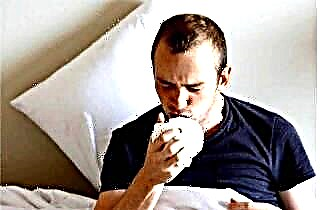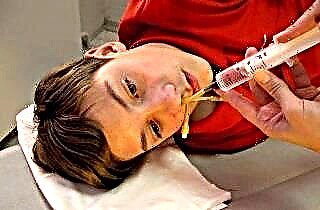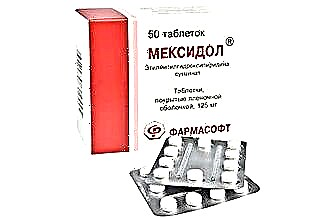Cough is a natural reaction of our body that clears the bronchi. It is not always a symptom of the disease and can be caused by foreign particles trapped in the respiratory system. If a cough lasts 14 days or more, this indicates the presence of infectious diseases, which, without treatment, eventually flow into a chronic form.
Main reasons
The causes of nocturnal cough in adults can be very different, a sudden attack occurs even due to the usual discomfort during sleep. Mucus accumulates in the nasopharynx and does not dissolve, as a result of which the airways are blocked.
Suffocating attacks of dry cough at night can occur due to dry or cold air, which irritates the mucous membranes. Airborne viruses are located in the respiratory system and are the most common cause of early cough.
Allergic reactions of the immune system to external factors can also provoke severe coughing attacks.
Severe cough at night in an adult and its causes:
 A barking cough and a hoarse voice most often indicates colds.
A barking cough and a hoarse voice most often indicates colds.- A silent cough often accompanies paralysis and destruction of the vocal cords.
- A dry and hacking cough can be a symptom of respiratory cancer.
- A dry, painful cough is the result of pleural involvement.
- A wet cough with a scanty viscous discharge is characteristic of tracheitis, bronchitis and asthma, purulent profuse discharge - for pneumonia, a rusty discharge indicates pleuropneumonia.
- Abundant sputum with a characteristic unpleasant odor is secreted with a lung abscess.
- Sputum with blood impurities, fever, fever, sweating and feeling unwell are characteristic of tuberculosis and cancer.
- Discharge when coughing, reminiscent of semolina, occurs when a hepatic abscess breaks out.
- Attacks of nocturnal cough with fever, dizziness, vomiting and a general broken state of the body are a manifestation of viral infections and flu.
- The cough itself without additional symptoms occurs with tuberculosis, pneumonia and lung cancer;
 Prolonged and dry worried about whooping cough;
Prolonged and dry worried about whooping cough;- Acute cough for several weeks can occur when foreign particles enter the respiratory tract, and also manifests itself against the background of ARVI.
- Dry, flowing into a wet form and passing in a week is a clear sign of infectious diseases.
- Prolonged cough during sleep, accompanied by congestion and difficulty breathing, is characteristic of rhinitis, sinusitis, sinusitis.
- A cough that lasts for more than a month may be a sign of cancer of the heart or respiratory system, or be the result of untreated bronchitis.
- Coughing fits at night in an adult can mean infectious diseases of the gastrointestinal tract, many of them are characterized by whistling whistles during inhalation and exhalation, and it is even possible to stop breathing during sleep.
It is very important to correctly diagnose any type of cough and treat it as early as possible in order to avoid complications.
How does the cough proceed?
 Most often, a cough occurs due to colds. Acute inflammation appears in the throat, proceeds with profuse mucus secretion. With the help of instinctive spasms, the body seeks to bring it out. There are various preparations for the respective type of cough. Any medicine primarily has a softening effect on the mucous membrane and is aimed at weakening spasm in the bronchi.
Most often, a cough occurs due to colds. Acute inflammation appears in the throat, proceeds with profuse mucus secretion. With the help of instinctive spasms, the body seeks to bring it out. There are various preparations for the respective type of cough. Any medicine primarily has a softening effect on the mucous membrane and is aimed at weakening spasm in the bronchi.
A wet cough occurs due to an excess of mucus in the trachea and lungs and is often the result of a dry form. Sputum serves as a breeding ground for bacteria, and with the help of a cough, the lungs need to be cleared of it. But if the cough worsens at night and persists for a long time, then it can flow into a chronic disease.
To help the body get rid of mucus and make it easier to cough up, doctors prescribe mucolytics. Their purpose is to liquefy the accumulated mucus.
If you are tormented by an attack of coughing, be sure to consume a sufficient amount of drink in the form of freshly prepared juices, mineral water, compotes, herbal or other weak teas. Timely treatment is important to help the body transform a dry cough into a wet, productive cough.
A sudden cough can be caused by dust, infection, allergens that irritate the mucous membranes. Coughing up allows the body to cleanse itself and bring the respiratory system back to normal.
A cough can proceed without a fever or runny nose, intensify at night and disrupt sleep, so do not hesitate to contact a specialist in time for correct and timely diagnosis.
Sometimes the attack hurts only at night. What does this mean?
 A cough at night with pain in the spine and chest area means an inflammation of the membrane in the chest that affects the lungs. This symptom is often troubling with pneumonia. Antibiotics are prescribed for treatment.
A cough at night with pain in the spine and chest area means an inflammation of the membrane in the chest that affects the lungs. This symptom is often troubling with pneumonia. Antibiotics are prescribed for treatment.- Nocturnal cough in adults with pain in the lateral part of the chest can mean a pathological process in the costal zone, chest, pleural malignancies, pericarditis.
- Coughing fits at night in an adult with sharp shooting painful sensations can mean a malfunction of the nervous system and inflammation of the nerve endings.
- Nocturnal cough in an adult with pain in the chest and back are vivid symptoms of osteochondrosis, tracheitis.
- A cough at night with a sharp sharp pain with frequent breathing may indicate lung cancer.
- Back and chest pains are caused by an excess of air in the pleura.
- Cough with chest pains occurs with pneumonia, acute bronchitis and asthma.
Diagnostics
 Considering that cough is only a symptom (and often the only one), attempts to deal with it, as with the main initiator of anxiety, without specifying the root cause, are useless, erroneous and fraught with complications. Patients suffering from cough need clinical, laboratory and instrumental examination. The most common diagnostic algorithm is a physical examination by a physician using a phonendoscope and x-ray. Based on the results, it is possible to determine the range of probable diseases and verify further studies.
Considering that cough is only a symptom (and often the only one), attempts to deal with it, as with the main initiator of anxiety, without specifying the root cause, are useless, erroneous and fraught with complications. Patients suffering from cough need clinical, laboratory and instrumental examination. The most common diagnostic algorithm is a physical examination by a physician using a phonendoscope and x-ray. Based on the results, it is possible to determine the range of probable diseases and verify further studies.
When establishing the cause of a cough, the underlying disease should be treated directly. With effective treatment, the cough will stop bothering you within a few days. According to the test results, antitussive or expectorant drugs are prescribed, respectively.
Treatment
 Antitussive medications are needed when the cough does not help cleanse the respiratory system. They are prescribed for a painful, hacking and unproductive cough. To relieve spasms and improve expectoration, antitussive and expectorant drugs are combined.
Antitussive medications are needed when the cough does not help cleanse the respiratory system. They are prescribed for a painful, hacking and unproductive cough. To relieve spasms and improve expectoration, antitussive and expectorant drugs are combined.
Mucolytic drugs (to thin sputum) are prescribed in cases where the sputum is viscous and difficult to pass. Bronchodilator drugs will help expand narrowed bronchi and improve the passage of oxygen through the respiratory tract.
It is contraindicated to take mucolytic and antitussive drugs at the same time, as this retains phlegm in the lower respiratory tract.
Antibiotic therapy is recommended only if there are clear signs of infection of bacterial origin with abundant secretion of purulent sputum and signs of intoxication. Antibiotics are not used to treat minor colds because their chemical components are powerless against viruses.
Cough medicines are produced in the form of mixtures, tablets, and syrups. For inhalation treatment, there is a commercially available device called a nebulizer, which grinds the molecule of the inhaled solution and promotes its deeper penetration into the bronchi.
To identify the causes of more serious diseases accompanied by a cough, you need to go through the following series of procedures:
 Therapeutic examination and auscultation of the lungs.
Therapeutic examination and auscultation of the lungs.- To pass a general analysis of blood and sputum.
- To make an X-ray.
- Undergo a computed tomography of the respiratory system.
- Make a spirometric study to assess the air permeability of the respiratory system and a procedure to assess the reversibility of bronchial narrowing.
- Perform a test to detect bronchial sensitivity, which manifests itself as bronchospasm.
- Examine blood gas composition.
- To assess the function of external respiration, which will determine the volume and capacity of the lungs. This method will give more results than spirography.
- Investigate the cellular composition of the bronchial membrane and examine the mucous membrane from the inside. This method is used to establish a more accurate diagnosis to rule out possible diseases with similar symptoms.
- Examine the vessels of the lungs, as well as consult a pulmonologist.

 A barking cough and a hoarse voice most often indicates colds.
A barking cough and a hoarse voice most often indicates colds. Prolonged and dry worried about whooping cough;
Prolonged and dry worried about whooping cough; A cough at night with pain in the spine and chest area means an inflammation of the membrane in the chest that affects the lungs. This symptom is often troubling with pneumonia. Antibiotics are prescribed for treatment.
A cough at night with pain in the spine and chest area means an inflammation of the membrane in the chest that affects the lungs. This symptom is often troubling with pneumonia. Antibiotics are prescribed for treatment. Therapeutic examination and auscultation of the lungs.
Therapeutic examination and auscultation of the lungs.

